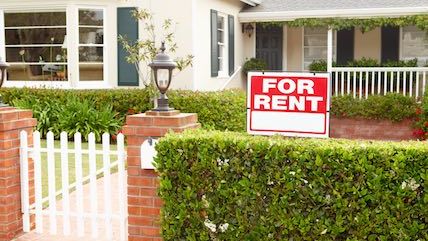Virginia Legislature's Airbnb Battle: Who Rules Your House?
Right now, renters can't collect.


The hotel lobby's effort to stop Airbnb rentals, says Tucker Martin, is like the horse-and-buggy lobby trying to stop the car industry.
Martin—a political consultant doing work for Airbnb, which enables homeowners to make a little extra money by renting out rooms for short periods—could have cited many other examples: Record companies trying to stop music downloads and streaming. Taxi companies trying to stop Uber. Newspapers trying to stop the Internet.
Such attempts (some of which have taken place) would be fools' errands. Technological and business innovation—the "gales of creative destruction," as Joseph Schumpeter called them—can't be stopped. Nor should they be.
Last year Virginians arranged 133,000 stays through Airbnb, which represented a 160 percent jump over the year before—even though Airbnb rentals are, in many localities, illegal. That's the case in Richmond, which nevertheless saw several hundred transient rentals during the UCI road cycling championships.
This year Del. Chris Peace introduced legislation that would create a statewide framework for Airbnb—the first such state-level framework in the country. It would have ensured that homeowners could rent out rooms for short stints no matter where they live in the commonwealth, and would have set up an arrangement for Airbnb to remit taxes to the state, which would then route them to the appropriate locality. Other provisions would ensure that property owners could use only their primary residence—a way to keep landlords from running what amounted to illegal hotels—and would prevent homeowners from renting out multiple rooms, so they didn't become de facto bed-and-breakfasts.
Those considerations have not mollified market incumbents or their advocates, such as state Sen. Tommy Norment, the majority leader.
Something must have crawled up Norment's nose and died this year. First he kicked members of the press out of their traditional spot on the Senate floor, then only grudgingly allowed them back—but without a desk to work on. Then he pushed legislation to weaken the anemic ethics reforms passed last year in the wake of Gov. Bob McDonnell's gift scandal.
Now, Norment—who has a financial interest worth more than half a million dollars in two hotels and who represents the hotel-heavy Williamsburg area—has inserted language in the Senate version of the state budget to kneecap Peace's bill by delaying its implementation for a year. Peace says the ploy is unprecedented.
It's also undemocratic. The legislation to legalize Airbnb already passed the House and Senate. But it worked: The House has conformed its bill to Norment's liking, which means it won't take effect for a year—if it ever does. A lot can happen in a year.
Yet Norment's maneuver won't stop people from using Airbnb. It will only stop localities from collecting the revenue they claim they need so badly. Curiously, some localities oppose Peace's legislation because they don't like losing authority over certain short-term rentals. Apparently they would rather have the illusion of control than the reality of additional revenue.
The hotel industry's concern about Airbnb is understandable: Nobody likes more competition. But its objections might be overstated. Many Airbnb listings offer rooms in residential neighborhoods far from hotel districts, which has the potential to induce tourism where it otherwise might not occur. Martin mentions the weekend fisherman who wants to hit a spot along the Rappahannock River where no hotel rooms can be had.
Granted, a lot of Airbnb rentals take place in cities, particularly during large sporting events and other big draws. In those cases, short-term residential rentals could act as a pressure valve on prices. Hotels might not be able to jack up room rates to twice the normal going rate if visitors have other options.
And having visitors spread themselves out can be good for the local economy. A visitor to Central Virginia who relies on a hotel chain might end up staying on Midlothian Turnpike and eating at Applebee's. A visitor who takes a private room in the Fan might have dinner at a funky neighborhood joint instead.
Peace—who also is championing partial deregulation of health care through a measure to reduce the scope of Virginia's odious certificate-of-need law—offers a purely normative reason for his Airbnb bill: If you own a house and you want to rent a spare room to someone every now and then, what right does anyone have to say you can't? It is, after all, your property.
For those unpersuaded by such principles, Airbnb can provide big numbers showing how much money homeowners can make and localities can reap in taxes through formalized arrangements. Figures from self-serving studies tend to be inflated and untrustworthy. But it's fair to say this much: Peace's legislation would ensure localities get vastly more from Airbnb rentals than what they are getting now: zilch.
This column originally appeared at the Richmond Times-Dispatch.
